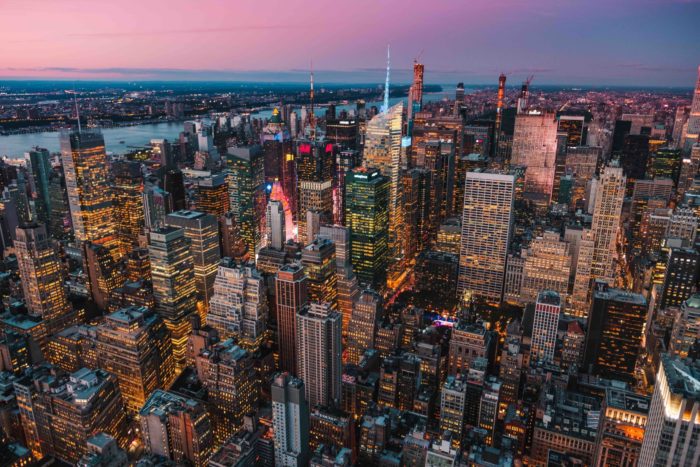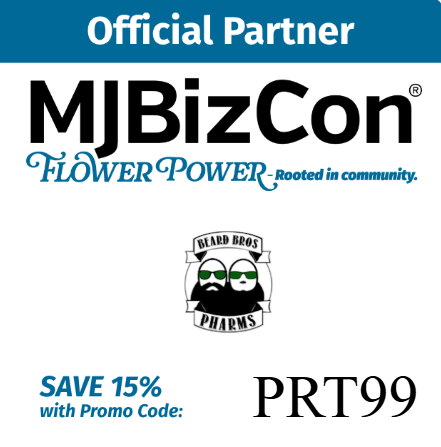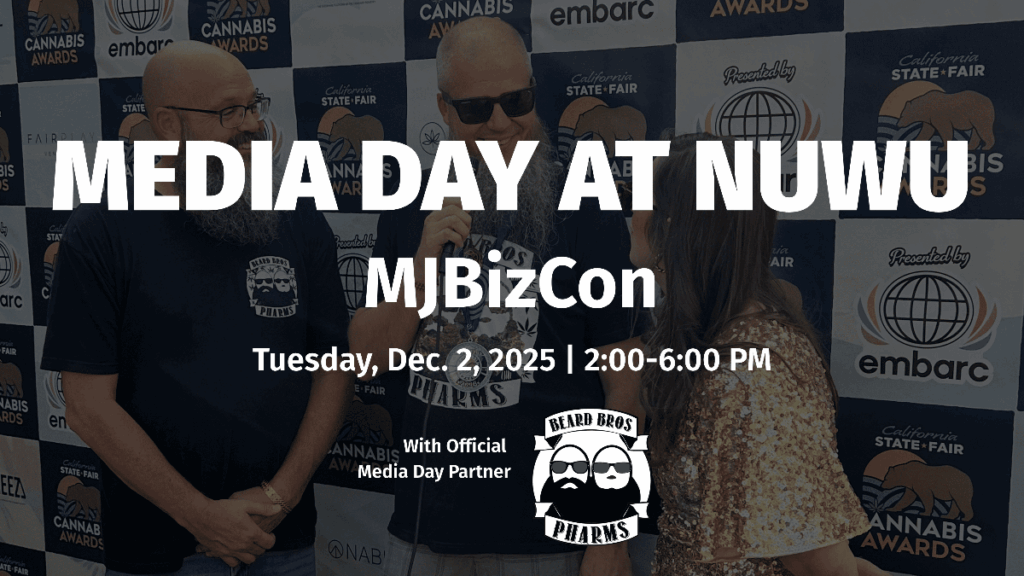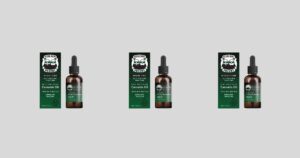Smoke shops have always been a frequent sighting in New York City. No matter the area, you could expect to find at least one within a fifteen-minute walk. When cannabis was legalized in New York in March 2021, even more illegal cannabis smoke shops began popping up— at an astronomic rate.
Depending on the neighborhood, you can now find a smoke shop on nearly every other block. In some neighborhoods, multiple smoke shops per block. One on each side of the street; two just a few doors down from each other; two on one side, one on the other. You no longer have to search your phone for the nearest one. Simply start walking, and it won’t be long before you find one.
And they don’t just sell smoking supplies anymore. They also sell actual weed— flower, concentrates, vapes, edibles… you name it, and you can probably find it. Some even sell magic mushrooms.
The traditional market, the legal market, and their shared enemy— the “gray market”
While we must show respect to the traditional market— who have been supplying us with our beloved crop for decades— what’s going on here is a different situation, a new “gray market.” Many of these retailers don’t really know much about what they’re selling. They simply saw an opportunity and followed the pack.
“We didn’t know much about selling weed, but we kept seeing other nearby smoke shops, bodegas, delis, etcetera sell it out in the open. Jars of weed on display, advertisements on the sidewalk, new shops everywhere,” a Williamsburg smoke shop owner, who wished to remain anonymous, told us. “Around the same time, our business was going down. We were obviously hesitant but decided to do it after talking to some suppliers that came into the store.”
We’re not talking the cashier-slash-lowkey-weed-dealers that have been commonly found in NYC bodegas and delis for years (the ones with an “iykyk” policy, who most certainly don’t advertise their services). And we’re not talking the traditional market of street dealers and legacy growers. What’s going on here is well beyond that.
Many of these storefronts actually advertise that they are legal, real dispensaries, which is certainly confusing for the average consumer that knows weed is legal in New York but doesn’t know much about the laws beyond that. Some, such as Empire Cannabis Clubs, believe they are taking advantage of a “legal” loophole to sell illegal products through a membership club model.
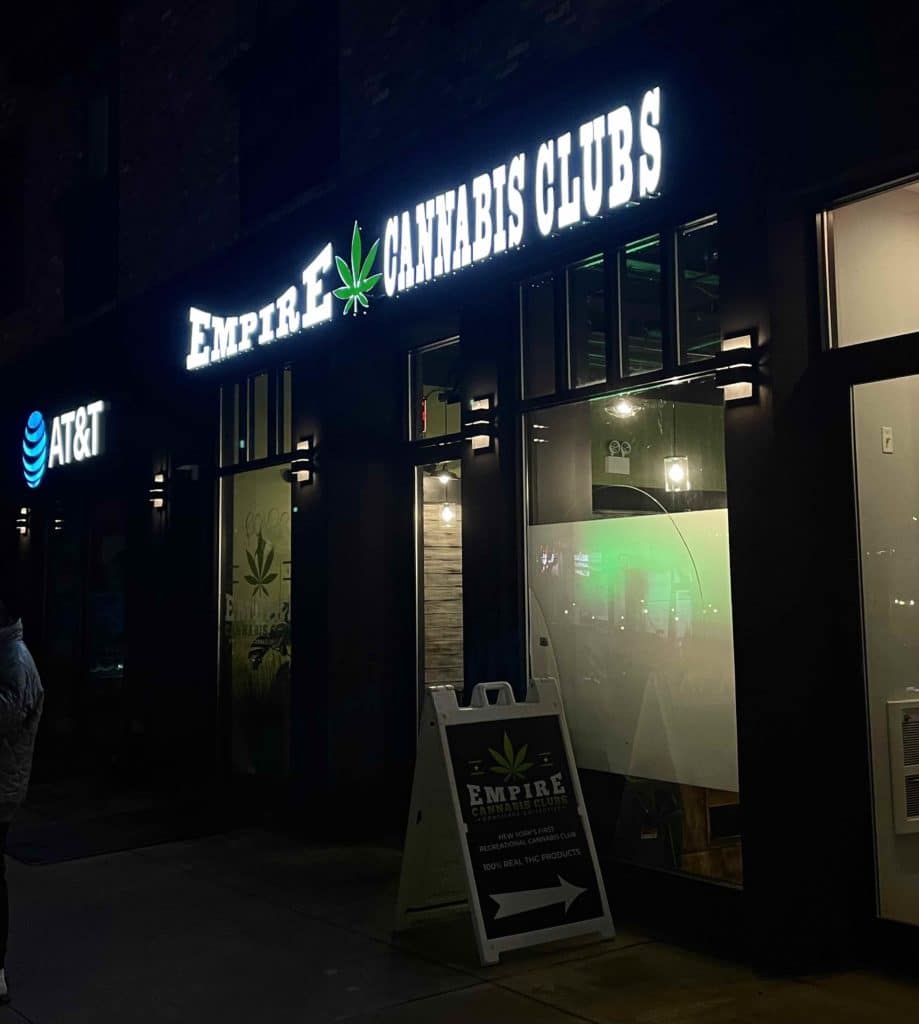
“The challenge is that consumers are not educated and think that all the gray market dispensaries are actually legal. For consumers, there is no way to really tell the difference when it comes to which dispensaries are legal and which are not. Many fake dispensaries put signage up even saying they are legal,” Karli Miller-Hornick, the CEO and co-founder of Florist Farms, a New York cannabis brand present in adult-use dispensaries, told Beard Bros.
Many other illicit sellers are simply delis, bodegas, CBD stores, and even cafes that decided to add cannabis to their shelves. While they may not advertise it as explicitly as smoke shops, the products are still displayed clearly.
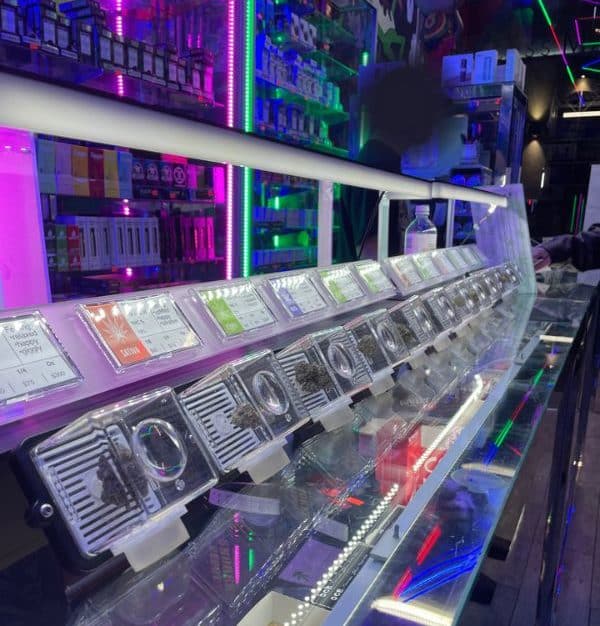
An astronomical gray market
Sheriff Anthony Miranda stated that authorities have identified 1,400 illicit locations, but this seems to be just a small fraction of the massive gray market. Comparatively, during the Prohibition Era, it was estimated that there were around 32,000 speakeasies illegally serving alcohol in NYC— with some estimates closer to 100,000. The number of illegal cannabis retailers in the Big Apple is likely closer to that.
In younger, “hipper” neighborhoods like Williamsburg and Soho, the volume seems to even exceed the considerable amount of trendy cafes that these areas have been known for. On every single block, no matter where you turn, without a fail, there will be a smoke shop in sight. You’ll probably find one on each side of the block, sometimes even two right next door to each other. And scattered amongst the smoke shop-lined streets are endless poster advertisements for illicit cannabis delivery services.
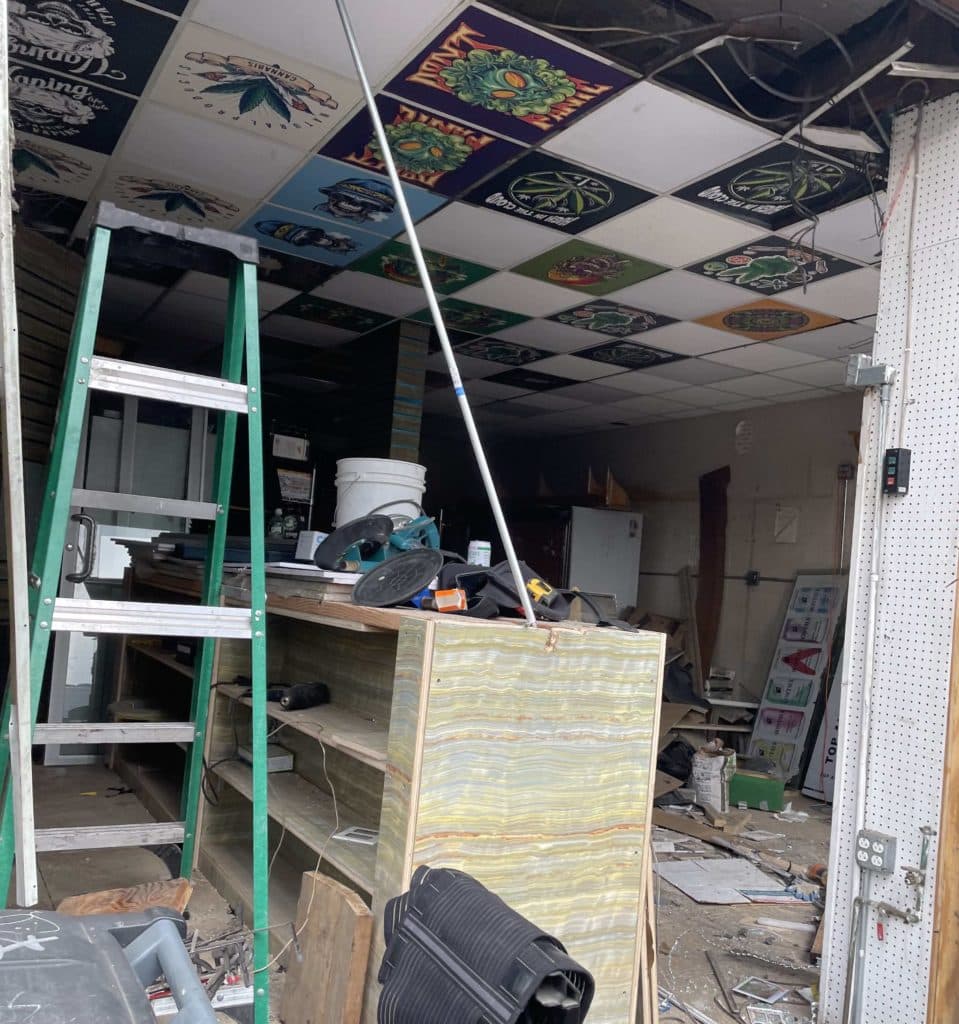
Even in family-oriented neighborhoods like Park Slope and the Uppers, these illicit shops are everywhere. You might bring your children to eat outside at your favorite neighborhood cafe just to find you’re sitting right next to a brand-new pot shop. You might even find one within 500 feet of their school, which is illegal.
The uncertainty between legalization and the market opening made way for the gray market
While the state took over a year to put the guidelines in place for recreational cannabis retail, smoke shops just went ahead and started selling illicit weed out in the open, in addition to hundreds of new head shops and illegal dispensaries popping up left and right, as well as the many buses and stands along the streets and in parks (especially in touristy areas).
And as for a lot of other “generally harmless” crime in NYC, the volume is too grand to crack down on it all, so they’ve mostly thrived. There’s the occasional raid, cease-and-desist letter, and impounded truck, but tens of thousands still persist— just as speakeasies did in the Prohibition Era. The state is focused on a social equity approach, righting the wrongs of the war on drugs, so it would be hard to justify more arrests right now. In fact, selling cannabis illegally in New York is punishable by only a $250 fine, which, reasonably, doesn’t seem to deter violators.
Though, the state is beginning to crack down on illicit stores by targeting landlords. “The state has started lawsuits against landlords who allow illegal shops to operate on their properties. Landlords who continue to allow illicit stores are at risk of losing their property. We’ll see how it goes. California has not been able to control the gray market, and it has had significant impacts on the success of the legal market,” Miller-Hornick informed us. So far, the Manhattan district attorney’s office issued warning notices to landlords of over 400 illicit shops.
Further, law enforcement has taken action against unlicensed stores selling to minors. A store located across the street from City Hall, Jungle Boys (unaffiliated with the licensed California brand), was fined $50,000, in addition to having an employee arrested.
Illegal weed shop across from City Hall fined $50K https://t.co/vc6izIjbsk pic.twitter.com/7MnIqhsttv
— New York Post (@nypost) February 15, 2023
When we asked the Williamsburg smoke shop owner if they ever worry about the potential negative outcome of illegally selling cannabis, they told us, “Of course. But we have too much competition now, and business is good. Many of our customers only come here for weed. We figure there are so many stores that we are invisible. So we don’t worry too much.”
Three legal recreational dispensaries against thousands of illicit storefronts. Can the legal market compete? Will the traditional market dissipate?
Currently, there are only three legal recreational dispensaries open in New York City, Housing Works Cannabis Co., Smacked Village, and Union Square Travel Agency. In total, 66 Conditional Adult-Use Retail Dispensary (CAURD) licenses have been issued— 36 in the first round last year and 30 more approved late last month, all issued to those who have been convicted of cannabis-related crimes or nonprofits with a history of helping the aforementioned. More storefronts are slated to open soon. But even so, the gray market is still expected to greatly overwhelm legal options.
When asked if Florist Farms is concerned about the gray market competition, Miller-Hornick stated, “The true concern is customer safety. The products in these stores are untested or are the products that have not passed their own state testing and have been shipped to New York in hopes to make a profit. I worry that these products could have failed heavy metals, pesticide, and solvent testing and could be unsafe for consumers.”
The quality you may find in this new frontier of illegal storefronts may not be the same as NYC’s traditional and adult-use market. But the convenience and appeal of this gray market, mixed with a general lack of knowledge of the situation, makes it seemingly irresistible to New Yorkers. This is harming not only the newly bloomed adult-use market but also the business of the original growers and suppliers in the traditional market. And it could also be harming consumers.
The New York Medical Cannabis Industry Association recently found that 40% of the 40 samples they tested across 20 illegal retailers contained contaminants like salmonella, E. coli, pesticides, and heavy metals. Additionally, these products could be more potent than advertised, with one sample containing more than double the amount of THC stated on the package. Not to mention, the harmful additives that have been commonly mixed into illicit cartridges, such as Vitamin E acetate.
“If consumers want to be absolutely sure their products are clean and safe, they should buy from licensed dispensaries. Our products at Florist Farms are tested not only for potency but for purity. We test for heavy metals, pesticides, microbials, and residual solvents. All of these things could cause a product to be harmful to somebody’s health. All products that go into legal dispensaries have to be tested and have a QR code on the packaging that leads to the lab results,” Miller-Hornick continued.
Besides the accessibility and despite health concerns, illegal dispensaries present appealing benefits, such as more options, cheaper prices, and even loyalty programs. It’s well known that California has the best weed in the country, and these illegal storefronts sell many products that claim they are imported from the Golden State. Leading brands like Cookies, Jungle Boys, STIIIZY, Connected, Raw Garden, 710 Labs, Jeeters, and many more are displayed in illegal storefronts around the city. Whether these are from the actual companies or are dupes is hard to know, but more likely than not, you aren’t receiving what you think.
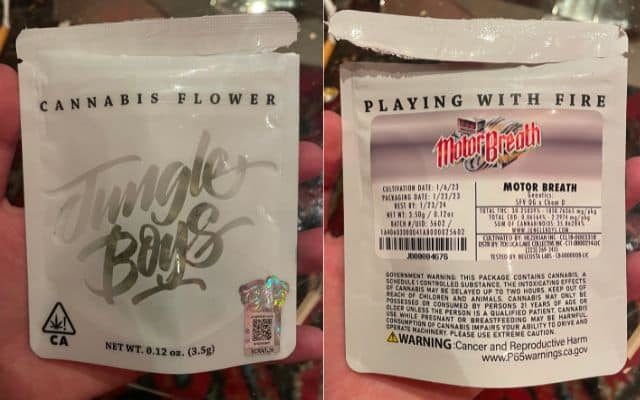
It’s possible that some of these products are legit, but it’s impossible to know unless you buy them from a legal dispensary. Some packages have a QR code that will lead you to a website that checks if the products are real. And many have a QR code that leads to nowhere. Chances are, the majority of these products are fake. Just think, if there are tens of thousands of illegal storefronts selling the same “California products,” how have none of these brands in heavily regulated markets gotten caught? Would it really be possible for these brands to supply all of these illegal storefronts on the other side of the country with such a large quantity of products? And even if it was possible, would they even be willing to take that risk?
“Conscious consumers should gain an understanding of how to read lab results and not consume a product before checking for them first.”
– Karli Miller-Hornick, CEO and co-founder of Florist Farms
It’s unclear where the illegal storefronts are sourcing their weed from. You have to remember that most of these guys aren’t your traditional street dealers, but rather people looking for a cash grab. Therefore, they may be buying the cheapest options and cutting corners on quality and safety. Many believe that these products are coming from legal brands in other states, but are the products that didn’t pass their own state regulations and testing.
In this day and age, the convenient choice is typically the most tempting, especially in New York City. When you can walk a minute around the corner and buy an 8th of weed over the counter, why would you deal with the hassle and wait of calling up your street dealer? Likewise, why travel across town to one of the few dispensaries when you can stay in your neighborhood and save money and time at your corner bodega?
The safest option will always be the legal option
Legal dispensaries have benefits that the illicit market could never compete with. Mainly, all products in the legal market are lab tested and follow strict guidelines set by the state to ensure the safety and quality of everything sold. Conversely, there is no way to know if gray market products have been tested; there’s no way to even know if the product you are receiving is what the package or retailer says it is. Additionally, many of the licensed cannabis brands in New York are legacy growers and those affected by the war on drugs, so supporting legal is also supporting the traditional market.
So while the gray market may seem like the better option in terms of accessibility, affordability, and variety, legal dispensaries will always be the safer option.
With more dispensaries set to open any day now, it’s only a matter of time before we see how this all plays out. But as for most businesses in NYC, there’s a large enough population for everyone to eat. All three markets— the legal market, the traditional market, and the gray market— may all thrive, despite one another.
“Enjoyed that first hit? Come chill with us every week at the Friday Sesh for a freshly packed bowl of the week’s best cannabis news!”

Hannah Gershowitz is a journalist and copywriter in the cannabis and music spaces. After graduating with a Music Business degree in 2021, Hannah took her passion for the auditory arts, holistic wellness, and cannabis culture to share words on publications like Respect My Region, Festival Insider, and Traklife, as well as for dispensaries around the US.



